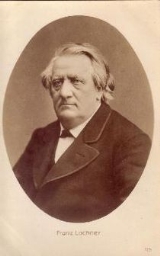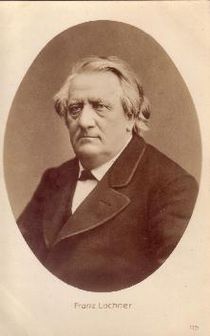
Franz Lachner
Encyclopedia

Germany
Germany , officially the Federal Republic of Germany , is a federal parliamentary republic in Europe. The country consists of 16 states while the capital and largest city is Berlin. Germany covers an area of 357,021 km2 and has a largely temperate seasonal climate...
composer
Composer
A composer is a person who creates music, either by musical notation or oral tradition, for interpretation and performance, or through direct manipulation of sonic material through electronic media...
and conductor
Conducting
Conducting is the art of directing a musical performance by way of visible gestures. The primary duties of the conductor are to unify performers, set the tempo, execute clear preparations and beats, and to listen critically and shape the sound of the ensemble...
.
Lachner was born in Rain am Lech to a musical family (his brothers Ignaz
Ignaz Lachner
Ignaz Lachner , was a German composer and conductor.Ignaz Lachner was born into a musical family at Rain am Lech. He was the second of the three famous Lachner brothers. Lachner's brothers Franz and Vinzenz, were also composers...
, Theodor and Vinzenz
Vinzenz Lachner
Vinzenz Lachner was a significant German composer and conductor....
also became musicians). He studied music with Simon Sechter
Simon Sechter
Simon Sechter was an Austrian music theorist, teacher, organist, conductor and composer.Sechter was born in Friedberg , Bohemia, then part of the Austrian Empire, and moved to Vienna in 1804, succeeding Jan Václav Voříšek as court organist there in 1824. In 1810 he began teaching piano and voice...
and Maximilian, the Abbé Stadler
Maximilian Stadler
Maximilian Johann Karl Dominik Stadler, Abbé Stadler was an Austrian composer, musicologist and pianist....
. He conducted at the Theater am Kärntnertor
Theater am Kärntnertor
Theater am Kärntnertor or Kärntnertortheater was a prestigious theatre in Vienna during the eighteenth and nineteenth centuries...
in Vienna
Vienna
Vienna is the capital and largest city of the Republic of Austria and one of the nine states of Austria. Vienna is Austria's primary city, with a population of about 1.723 million , and is by far the largest city in Austria, as well as its cultural, economic, and political centre...
. In 1834, he became Kapellmeister
Kapellmeister
Kapellmeister is a German word designating a person in charge of music-making. The word is a compound, consisting of the roots Kapelle and Meister . The words Kapelle and Meister derive from the Latin: capella and magister...
at Mannheim
Mannheim
Mannheim is a city in southwestern Germany. With about 315,000 inhabitants, Mannheim is the second-largest city in the Bundesland of Baden-Württemberg, following the capital city of Stuttgart....
. In 1835 he received the first prize for symphonic composition at Vienna with his Sinfonia passionata, and became royal Kapellmeister at Munich
Munich
Munich The city's motto is "" . Before 2006, it was "Weltstadt mit Herz" . Its native name, , is derived from the Old High German Munichen, meaning "by the monks' place". The city's name derives from the monks of the Benedictine order who founded the city; hence the monk depicted on the city's coat...
, becoming a major figure in its musical life, conducting at the opera and various concerts and festivals. His career there came to a sudden end in 1864 after Richard Wagner
Richard Wagner
Wilhelm Richard Wagner was a German composer, conductor, theatre director, philosopher, music theorist, poet, essayist and writer primarily known for his operas...
's disciple Hans von Bülow
Hans von Bülow
Hans Guido Freiherr von Bülow was a German conductor, virtuoso pianist, and composer of the Romantic era. He was one of the most famous conductors of the 19th century, and his activity was critical for establishing the successes of several major composers of the time, including Richard...
took over Lachner's duties. Lachner remained officially in his post on extended leave for a few years until his contract expired.
Work
Lachner was a well-known and prolific composer in his day, though he is not now considered a major composer. His work, influenced by Ludwig van BeethovenLudwig van Beethoven
Ludwig van Beethoven was a German composer and pianist. A crucial figure in the transition between the Classical and Romantic eras in Western art music, he remains one of the most famous and influential composers of all time.Born in Bonn, then the capital of the Electorate of Cologne and part of...
and his friend Franz Schubert
Franz Schubert
Franz Peter Schubert was an Austrian composer.Although he died at an early age, Schubert was tremendously prolific. He wrote some 600 Lieder, nine symphonies , liturgical music, operas, some incidental music, and a large body of chamber and solo piano music...
, is regarded as competent and craftsman-like, but is now generally little known. Among his greatest successes were his opera Caterina Cornaro (1841), his Requiem
Requiem
A Requiem or Requiem Mass, also known as Mass for the dead or Mass of the dead , is a Mass celebrated for the repose of the soul or souls of one or more deceased persons, using a particular form of the Roman Missal...
and his seventh orchestral suite
Suite
In music, a suite is an ordered set of instrumental or orchestral pieces normally performed in a concert setting rather than as accompaniment; they may be extracts from an opera, ballet , or incidental music to a play or film , or they may be entirely original movements .In the...
(1881). In the present day it may be his organ
Organ (music)
The organ , is a keyboard instrument of one or more divisions, each played with its own keyboard operated either with the hands or with the feet. The organ is a relatively old musical instrument in the Western musical tradition, dating from the time of Ctesibius of Alexandria who is credited with...
sonata
Sonata
Sonata , in music, literally means a piece played as opposed to a cantata , a piece sung. The term, being vague, naturally evolved through the history of music, designating a variety of forms prior to the Classical era...
s (Opp. 175, 176, 177) as well as chamber music
Chamber music
Chamber music is a form of classical music, written for a small group of instruments which traditionally could be accommodated in a palace chamber. Most broadly, it includes any art music that is performed by a small number of performers with one performer to a part...
, in particular his music for wind instrument
Wind instrument
A wind instrument is a musical instrument that contains some type of resonator , in which a column of air is set into vibration by the player blowing into a mouthpiece set at the end of the resonator. The pitch of the vibration is determined by the length of the tube and by manual modifications of...
s, that receives the most attention, though his string quartets and some of his eight symphonies have been performed and recorded. His songs, some of which are set to the same texts that Schubert used in his songs, contributed to the development of the German Lied
Lied
is a German word literally meaning "song", usually used to describe romantic songs setting German poems of reasonably high literary aspirations, especially during the nineteenth century, beginning with Carl Loewe, Heinrich Marschner, and Franz Schubert and culminating with Hugo Wolf...
.
For performances of Luigi Cherubini
Luigi Cherubini
Luigi Cherubini was an Italian composer who spent most of his working life in France. His most significant compositions are operas and sacred music. Beethoven regarded Cherubini as the greatest of his contemporaries....
's Médée
Médée (Cherubini)
Médée is a French language opéra-comique by Luigi Cherubini.The libretto by François-Benoît Hoffmann was based on Euripides' tragedy of Medea and Pierre Corneille's play Médée....
in Frankfurt in 1855, Lachner composed recitative
Recitative
Recitative , also known by its Italian name "recitativo" , is a style of delivery in which a singer is allowed to adopt the rhythms of ordinary speech...
s to replace the original spoken dialogue, and it was this version, translated into Italian, which was used in many twentieth-century revivals and recordings of that opera.

